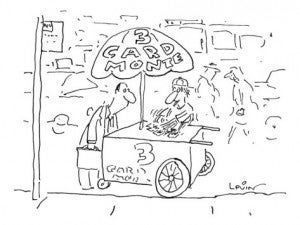This commentary was originally posted on the Texas Clean Air Matters blog.
First we have enough generating capacity, but next year is the problem; now that next year is upon us it’s really the next few years that are the issue. The Electric Reliability Council of Texas (ERCOT), grid operator for most of Texas, foresees potential electricity shortages. Clearly the risk is real, but when? This year? Two years from now? Reports swirl by, some only weeks apart, showing different numbers and contradicting previous reports. Are we seeing a bureaucratic version of Three-card Monte?
During last summer’s drought, demand peaked on August 3, using more than 68,000 megawatts. ERCOT’s stated goal is to maintain a 13.75% reserve margin in generating capacity. Their latest report shows the state’s electrical grid will fail to meet the target reserve margin as soon as 2014, two years from now. A report in early May actually shows that this summer ERCOT will fail to meet that target as well, although it isn’t stated explicitly.
Meanwhile EPA is meeting with ERCOT and the nation’s other grid operators to develop an implementation timeline for the new Maximum Achievable Control Technology (MACT) air toxics rule, which should begin this fall. Utilities have three years to implement the new rules…unless the three-year timeline threatens grid reliability. Then utilities can get a fourth year…unless grid reliability is still threatened. Then utilities have a full five years to comply.
Concerns about grid reliability are very real, but they are due to power companies deciding to hold off on constructing new power plants while prices are so low. Unfortunately some state leaders and utilities have seized on these ERCOT reports, and are shifting their conclusions in an attempt to delay rules that have been in the works for years, and in some cases decades. The new EPA standards will dramatically cut mercury, heavy metals, acid gas and other emissions from power plants. The public health benefits to our state will be enormous, especially for Texas children who breathe air tainted by power plant emissions. The cost of unwarranted delay is a price Texas should not have to pay.










